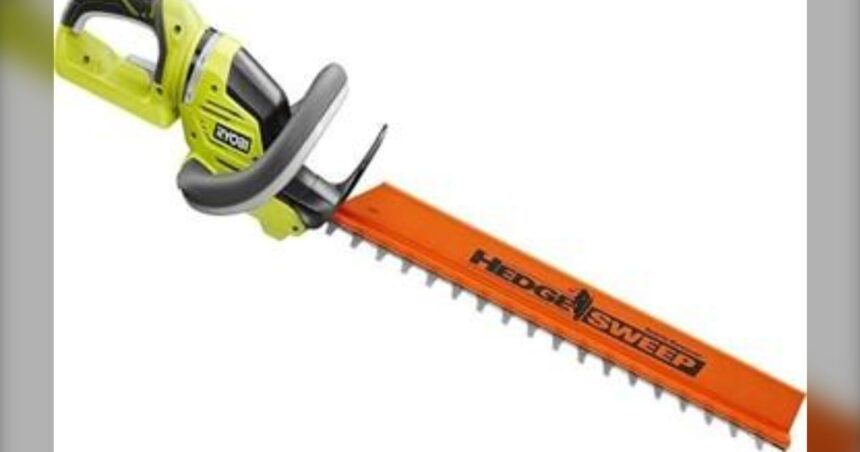As Ottawa’s summer gardening season kicks into high gear, Canadian homeowners are being urged to check their tool sheds following a major safety recall that touches neighborhoods from Victoria to St. John’s.
More than 125,000 Ryobi cordless hedge trimmers sold across Canada and the United States have been pulled from shelves after multiple reports of serious injuries. The recall, announced yesterday by Health Canada and the U.S. Consumer Product Safety Commission, affects popular 18V and 40V models where blades have unexpectedly continued running even after users released the trigger.
“I’ve seen the impact of these kinds of product failures firsthand,” says Martha Conley, head of the Canadian Product Safety Coalition. “What seems like a minor design flaw can lead to life-altering injuries in seconds.”
According to Health Canada’s recall notice, at least 18 Canadians have reported incidents with the affected trimmers, with five resulting in lacerations requiring medical attention. South of the border, U.S. authorities have documented 28 injuries, including several that required emergency surgery.
The timing couldn’t be worse for weekend gardeners. June traditionally marks the beginning of hedge maintenance season across much of Canada, with the first major trimming typically scheduled after spring growth spurts. Hardware retailers like Canadian Tire and Home Depot have already begun contacting registered purchasers directly through their loyalty programs.
“We’re pulling everything off the floor immediately,” explains Jason Trudeau, manager at a Home Hardware in Kanata, Ontario. “Customer safety comes first, even if it means disappointed gardeners during our busiest season.”
The affected models include several from Ryobi’s most popular cordless lines manufactured between January 2022 and March 2025. Serial numbers for the recalled units can be verified through Ryobi’s Canadian support website or by calling their recall hotline.
For Brampton homeowner Sylvia Chen, the recall notice arrived too late. “I was trimming my cedar hedge when the blades just wouldn’t stop,” Chen told me during a community garden event last weekend. She suffered a deep cut requiring eight stitches when the trimmer continued running after she set it down. “I’ve always trusted Ryobi tools. Never imagined something like this could happen.”
The technical issue involves a faulty switch mechanism that can become stuck in the “on” position even after the trigger is released. This presents a serious laceration hazard when users assume the tool has powered down. Engineering experts note this particular malfunction bypasses multiple safety features designed to prevent exactly this type of accident.
Ryobi’s parent company, Techtronic Industries, has established a streamlined replacement program. Affected customers will receive a completely new unit rather than a repair kit, acknowledging the serious nature of the defect. The company has also extended its standard warranty by an additional year on replacement trimmers.
“We’re seeing a textbook response to a serious product failure,” notes consumer advocate Martin Williams from the University of Toronto’s Consumer Protection Institute. “The company isn’t hedging or downplaying – they’re acknowledging the risk and providing clear steps for consumers.”
Garden tool recalls are relatively rare in Canada, with most safety incidents involving power tools typically linked to user error rather than product defects. According to the latest Statistics Canada data, approximately 4,200 Canadians required hospital treatment for injuries related to powered garden equipment in 2024, though most involved riding lawnmowers rather than handheld tools.
For those wondering whether their trimmer is affected, the recall covers specific 18V and 40V models with production dates stamped on the underside of the handle. Health Canada has published the complete list of serial numbers on its recall database.
Local garden centers across Canada report fielding dozens of calls from concerned customers. Many are offering loaner tools to help homeowners complete time-sensitive yard maintenance while waiting for replacements, which Ryobi estimates will take two to three weeks to fulfill.
Ottawa landscape contractor Devon Williams had to reshuffle his entire summer schedule after discovering six affected trimmers in his company’s equipment shed. “This is our busiest season. With the wetter-than-normal spring, everything’s growing like crazy. Having to pull all these tools out of rotation is going to hurt small businesses like mine.”
The recall also highlights growing questions about quality control in the increasingly competitive cordless tool market. As battery technology has improved over the past decade, manufacturers have raced to convert traditionally corded tools to portable versions, sometimes with safety implications.
Federal regulators emphasize that consumers should immediately stop using affected trimmers and unplug their battery packs. Those uncertain about their model’s status can check by removing the battery and looking for the manufacturing code on the underside of the tool.
With replacement units expected to arrive in households throughout July, many Canadians face the prospect of temporarily overgrown hedges. As Martha Conley from the Product Safety Coalition reminds us, “A shaggy hedge for a few weeks is a small price to pay compared to a trip to the emergency room.”






